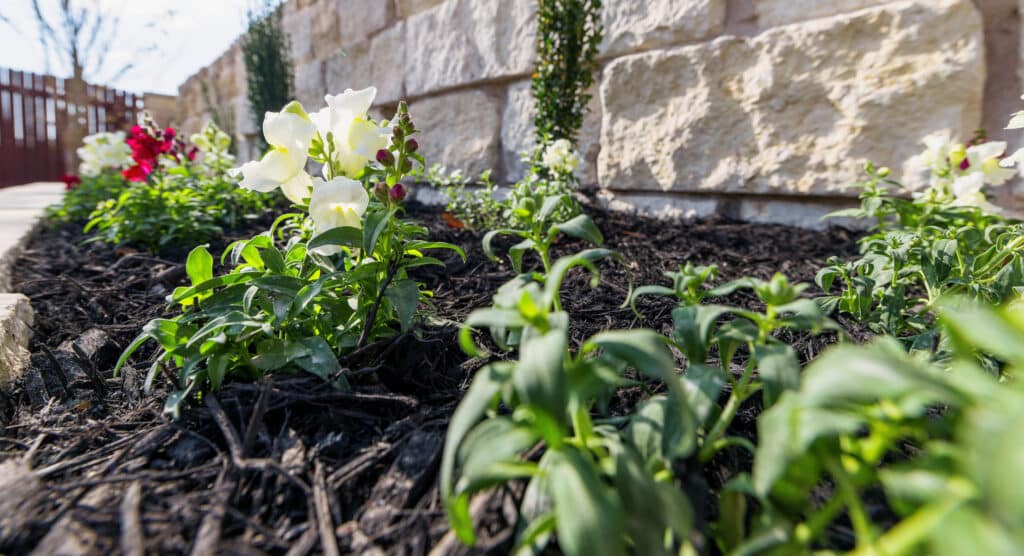Anyone from Texas can tell you that we have unique weather patterns. There are few other places where you can experience all four seasons in just one day. The running joke of “if you don’t like the weather, just wait a minute” rings true to many of us. While it can be nice to experience summer weather on a December day here in Texas, winter flowers can pose a challenge for even most experienced gardeners. Below you’ll find our top tips for Texas residents on how to “winterize” your garden in Texas and satisfy your winter gardening cravings.
Preparing Your Garden

Protect your garden from pests
Ensuring that you have a healthy garden before winter begins is especially important if you plan on minimal garden maintenance during the winter months. In Texas, you’ll start to get some serious (by Texas standards) cold weather toward the end of November. These cold fronts typically last until the end of February. Your pre-winter garden cleanup should also include the removal of any dead plant debris or stalks, as these can be a breeding ground for harmful diseases and other pests. If you have plants that you know are finishing annuals, remove them at the start of winter for a clean slate of soil when spring rolls around.
Prepare the beds
Winter is a great time to let nutrients really soak into the ground so that when prime gardening time rolls around during the spring, your soil is healthy and nutrient-rich from months of decomposition. Before the winter rains start, add around 3 inches of compost to your beds. Over time, the compost will decompose into crucial nutrients in the soil, making springtime gardening a breeze. Most of central and southern Texas won’t experience steady freezing temperatures throughout the winter that would make it worthwhile to try to keep the garden frozen with mulch. However, based on last year’s winter storm and the prediction of this year being the same if not worse, mulching your gardens at the beginning of the winter might be beneficial.
Freezing temperature planning
In Texas, below-freezing temperatures are spread out throughout the wintertime. You might experience your first isolated freeze toward the middle of November. Freezes will become more frequent as the winter progresses; however, they are rarely constant. It’s a good idea to have a plan in place for when freezes do come to make sure that your perennials (plants that survive winter) are protected for re-blooming in the spring. Since freezes are quite sporadic during a Texas winter, it’s feasible for you to pull out all the stops when you hear news of a freezing cold front. Be prepared to take the following actions when a freeze is imminent:
- Cover shrubs and other tender plants with some sort of fabric (burlap, sheets, etc.). Do not use plastic to cover your plants.
- If high winds are expected, plan to cover evergreen plants as well.
- Cut back perennials to a few inches above where the stem meets the plant’s crown at soil level (with the exception of hardier perennials, which should be left unpruned).
How To Water During Winter in Texas
Watering your garden
There are several tips to keep in mind when watering your garden during the winter. You’ll want to water your plants once or twice a month unless Texas is experiencing a particularly dry winter. Your plants are likely to absorb more water during the earlier hours of the day; however, try to make sure that the temperatures are above 45 degrees Fahrenheit. For most days, this shouldn’t be an issue in Texas, but every once in a while, you’ll get a cold snap during which temperatures dip below normal. Make sure to water both winter plants as well as perennials that might be dormant, as their roots will still need water to stay alive until spring. Only water until the soil of your garden is moist, and try to avoid watering when you are expecting a freeze!
Watering your lawn
Though it may be tempting, make sure to remain on a consistent watering schedule until temperatures drop below freezing. You can typically expect this to happen during some point in November, so plan to continue with your regular watering schedule until the days start to get significantly shorter. Truly frozen lawns aren’t a huge concern in Texas, as it typically doesn’t stay below freezing for more than a night or two. You should plan to stay on a fairly consistent watering schedule when you are experiencing a dry winter. Barring frozen soil, we recommend watering your lawn every two to three weeks for 15 to 20 minutes during the winter months.

It’s especially important to water your lawn earlier during the day in the winter so that it has adequate time to dry before the evening rolls around. For ease of watering your lawn during the cold winter months, we recommend using a sprinkler system that you can simply schedule to turn on in the morning for 15 minutes, minimizing time spent outside in the chilly weather. Check out our favorite Rainbird ESP-ME below.
Don’t have a sprinkler system in place? Give us a call to schedule your FREE in-person consultation at (512)260-1430.
Serving Austin and it’s greater areas including: Leander, Liberty Hill, Georgetown, Cedar Park, Round Rock, Pflugerville, Lago Vista, Lakeway, Marble Falls, Burnet, and Bertram


